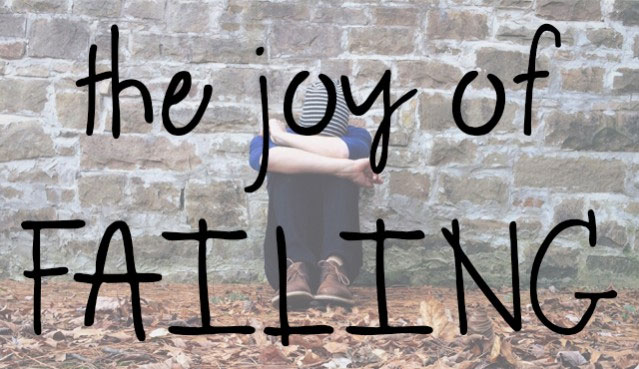
Throughout my career working with kids, I have tried to teach youth many valuable lessons, but perhaps the most important lesson I could ever teach is, “It takes courage to fail.”
You see, most kids are trained to be scared of failure. I see it every single day. Society constantly teaches kids that failing is equivalent to being “a loser” or that failing means they are not good enough.
Fear of failure is everywhere, and this fear can have a completely devastating on many kids’ futures.
Quite often as a result of this fear, unless kids are told that they are “a natural” at a sport, that they were “born to be an actress” or that they are a “math genius,” they never even bother to try out for the sports team, audition for the school play, or apply themselves in math class. They are afraid to try anything new, and consequently, they are never able to grow and reach their potential.
But being praised for “natural abilities” and being taught to fear failure is exactly the opposite of what kids need. It is vitally important that kids realize that their failures and learn that their “natural abilities” do not define who they are or what they can become. They need to be encouraged to be willing to fail.
Kids need to be taught that failing can lead to growth – it can introduce them to new experiences and passions. That being willing to try, and fail, can help them improve their lives and the lives of those around them.
However, kids are not going to learn from failure on their own. So how do we teach kids that it’s ok to fail? How can we show them that failure is a necessary step to growth and true success?
At Camp Fire, through implementing the Thrive Theory, helping kids learn to fail is an intimate part of every program we do. Whether it’s in our Child Development Center, our after school programs, our teen program, or out at Camp El Tesoro, we encourage kids to try new things, to set goals, to reflect on their experiences, and to continue to persevere – even when things are difficult. After all, as it has been said before in many ways, “Nothing in this world worth having comes easy.”
Thrive Theory begins by first finding out what kids are passionate about – their sparks. In order to connect with kids, youth workers need to know something that the kids can identify with, something that motivates them. That is what sparks are – Sparks are a source of motivation. Sparks are the passions, skills, and strengths that are discoverable in all of us.
Not only do our staff members help youth identify their sparks, but the staff members also fill the vitally important role of “Spark Champion.” These Spark Champions help affirm each child’s spark, model the spark, provide youth with opportunities to express their sparks, and provide encouragement for youth to continue to pursue their sparks.
Spark Champions also serve the important role of admitting their own failures and modeling healthy responses to failure.
As a youth worker, I fail every single day. There is always something that could be done more efficiently, or could have been handled better, but failure does not stop me from continuing on. And these failures give me opportunity after opportunity to model some critical skills for youth to develop – developing a growth mindset and having grit.
Growth mindset is a term coined by Dr. Carol Dweck, who defines a growth mindset as possessing an understanding that through hard work and practice, “we can grow our brain’s capacity to learn and to solve problems.” Dr. Dweck’s studies have shown that “every time you push yourself out of your comfort zone to learn something new and difficult, the neurons in your brain can form new, stronger connections, and over time, you can get smarter.”
In other words, this shows that being brave enough to fail can help kids to become smarter.
So how can a growth mindset be taught to children? Dr. Dweck suggests that in order to help kids become hardy and resilient that “First of all, we can praise wisely, not praising intelligence or talent.” Instead, to encourage a willingness to fail and grow, we need to encourage and praise the “process that kids engage in, their effort, their strategies, their focus, their perseverance, their improvement.”
Having a growth mindset is the key to helping kids learn to take risks and fail. After all, if kids don’t believe they are capable of accomplishing something, why would they even try?
After kids have begun to adopt a growth mindset, they then need to learn how to set goals and how to not give up when things get tough. They need to develop grit.
According to Angela Lee Duckworth in her inspiring Ted Talk, “Grit is passion and perseverance for very long-term goals. Grit is having stamina. Grit is sticking with your future, day in, day out, not just for the week, not just for the month, but for years, and working really hard to make that future a reality. Grit is living life like it’s a marathon, not a sprint.”
Grit is courage. Grit is understanding that failure is not the end but is an opportunity to learn. Grit is knowing that failure leads to growth.
Through my work with kids, ultimately this characteristic of grit is what I want kids to develop. By helping kids identify their sparks, encouraging them to have a growth mindset, showing them how to set goals and reflect on their experiences, I want to teach children that failure can be a source of joy – because ultimately failure can help them to be the best they can be.
 Jacob Summer is the director of after school programs and El Tesoro camp director for Camp Fire First Texas. Jacob first began working with youth at the age of 17 as a day camp counselor in his hometown of Lafayette, Indiana. Since then, he has held multiple positions, including summer camp counselor, after school program staff member, camp and administrative director and summer camp site supervisor. Jacob also taught math for two years in a middle school and spent nine weeks teaching high school math in Kabula, Kenya. He holds a Master of Public Affairs with a concentration in nonprofit management from Indiana University, and a B.S. in Secondary Math Education from Indiana University.
Jacob Summer is the director of after school programs and El Tesoro camp director for Camp Fire First Texas. Jacob first began working with youth at the age of 17 as a day camp counselor in his hometown of Lafayette, Indiana. Since then, he has held multiple positions, including summer camp counselor, after school program staff member, camp and administrative director and summer camp site supervisor. Jacob also taught math for two years in a middle school and spent nine weeks teaching high school math in Kabula, Kenya. He holds a Master of Public Affairs with a concentration in nonprofit management from Indiana University, and a B.S. in Secondary Math Education from Indiana University.






